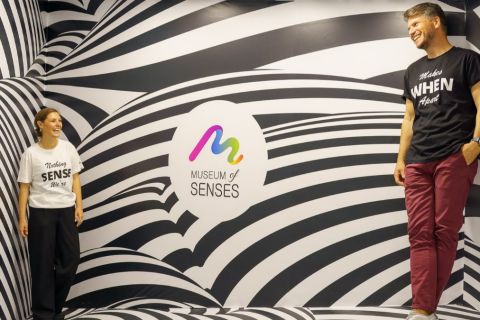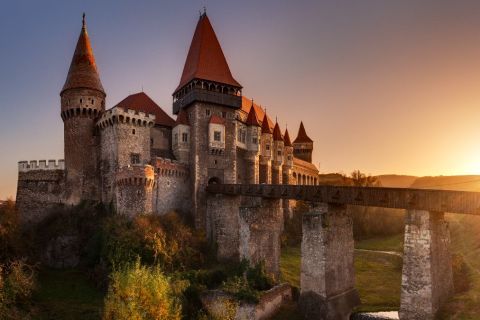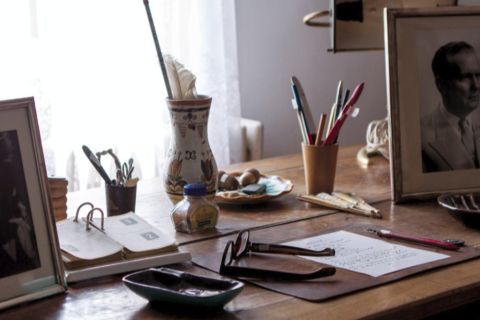
Etnographic Museum of Transylvania
The building where the administrative headquarters of the Ethnographic Museum of Transylvania is located took its name from the main hall inside the building, called "Reduta" (from fr. Redoute = dance hall). However, the history of the building is much older. In the Middle Ages, there were three buildings on this site, one of which retains a Renaissance setting from the early seventeenth century. In the 18th century, the most important inn of Cluj operated here, which was called "Calul alb" (or "Calul Bălan"). Emperor Joseph II (1780-1790) changed the purpose of the building, turning it into a school for officers. The city regained the building in 1794, carrying out in the following decades extensive renovation works, completed after 1830. These works were carried out according to the plans of the most important architects of the time: Joseph Leder, Mihály Kindt, Georg Winkler, Anton Kagerbauer.
The "Reduta" hall hosted, in the 19th century, countless important events in the political and cultural history of Transylvania. Several sessions of the Transylvanian Diet took place here, during which extremely important decisions were adopted for the history of the Grand Principality of Transylvania. In this hall performed some of the great musicians of the world: Franz Liszt, Johannes Brahms, Bela Bartok, George Enescu. The Transylvanian Museum Society (1859) and the Hungarian Culture Society of Transylvania (1885) were founded here. In 1872, in the “Reduta” hall, the congress of the Transylvanian Association for the Culture of the Romanian People (Astra) took place, during which Vasile Ladislau Pop was elected president of the organization.
In 1894, in this hall took place the well-known political process known as the "Memorandum Trial", filed by the Hungarian authorities of the time of the leaders of the Romanian national movement. During this process, the leader of the Romanian National Party, Dr. Ioan Rațiu, said the historic words: "The existence of a people is not discussed, it is asserted!".
In 1897, in the "Reduta" hall, the first film screening in the history of the city took place. The building hosted congresses and meetings of political parties and cultural associations, fencing championships, masked balls. In 1925, the building was loaned by the municipality to the Romanian Army, for a period of 25 years. During this period, an officer's casino operated in the building.
In 1957, the Ethnographic Museum in Transylvania was assigned its current headquarters, the historic building "Reduta" on Memorandum Street no. 21, and starting with 1958, the restoration works of the building began. The museum operates in this building to this day, thus becoming one of the most important landmarks on the cultural map of Romania.
In the current contemporary sense, Transylvania includes both the intra-Carpathian space of medieval Transylvania, and Maramureș, Crișana and Banat, lands with which it has formed and still forms, under the aspect of rural culture, a relatively unitary area. The intercultural dimension fundamentally defines this area, in which Mediterranean, Eastern European and Western European cultural elements coexisted, partly amalgamated in the crucible of a common daily existence, partly delimited consciously, through a targeted identity approach. The rigid socio-economic system, which maintained the feudal structures in the countryside until the middle of the 19th century, generated in Transylvania a strong cleavage between the urban environment, largely connected to the central and western European urban values, and the village environment, maintained in a relative autarchy, which favored the preservation, until late, of some archaic techniques and mentalities.
The current permanent exhibition, entitled “Popular culture in Transylvania - sec. XVIII – XX ”, opened in 2006, tries to reconstruct, through exhibits, this rural universe, characterized by organicity, highlighting its unsuspected complexity and functional coherence of its components.
The exhibition addresses - in the manner that has become a classic in ethnographic museography - the main fields of material and spiritual culture in rural Transylvania, illustrated by representative exhibits, selected from over 40,000 artifacts in the collections of our institution.
The exhibition begins with the representation of traditional occupations, starting with the archaic ones (nature harvesting, hunting, fishing, beekeeping) and continuing with the main ones (cultivating the land and raising animals).
The simple but extremely ingenious pieces, characteristic of the first category occupations (improvisations from tree bark, scurvy trunks, animal horns, braided twigs, etc.) are followed by diversified tools, with a higher degree of complexity, used in agricultural activities. and pastoral and exposed in the order dictated by the development of specific technological processes. Archive photos mark these
About this ticket
Experience
- Many years of ethnographic history of the Transylvanian space
- 40,000 artifacts available for viewing
- An unique experience
- The acces in museum.
- Souvenirs
- Food and beverages
- Guide
Free cancellation up to 24 hours before the reserved date. If you cancel under this time or do not show up, you will not be refunded.
Important information
- No parking in front of the museum
- Closed Monday and Thuesday
- Located in the downtown of the city
- What's not allowedLarge luggageFood and drinksConsumption of alcoholic beverages SmokingLittering
Plan your visit
Book as soon as possible to guarantee availability, especially during public holidays and festivities.
Once your booking has been confirmed, you will receive an email containing your booking voucher. Please print it out or download on your smartphone/tablet to show on the day of the activity.
If you still have more questions, check out our section on frequently asked questions. If you need help to book an activity or have any enquiries, please contact us.



